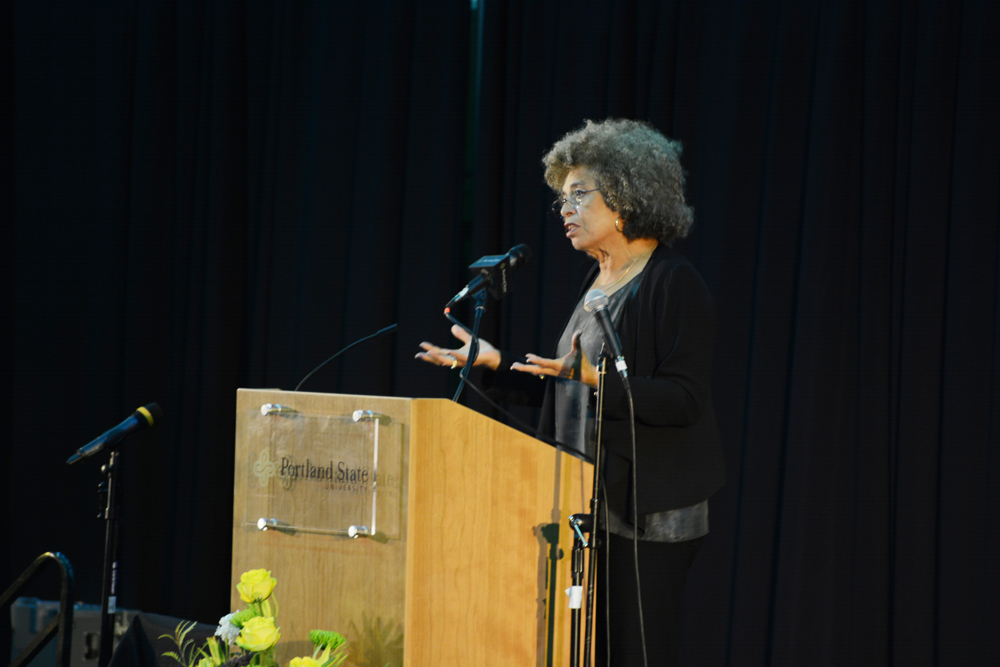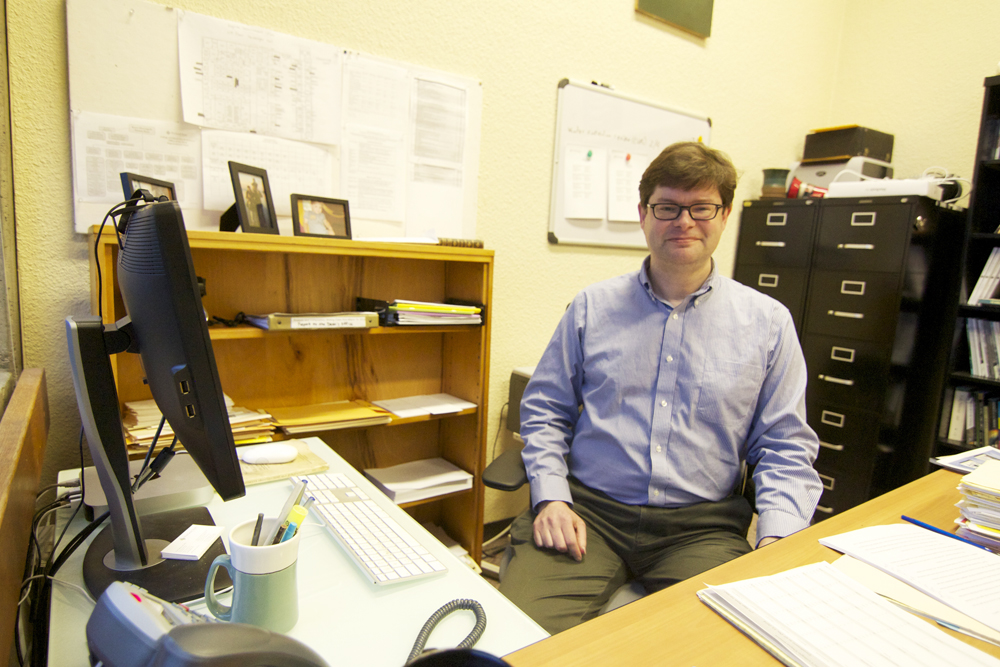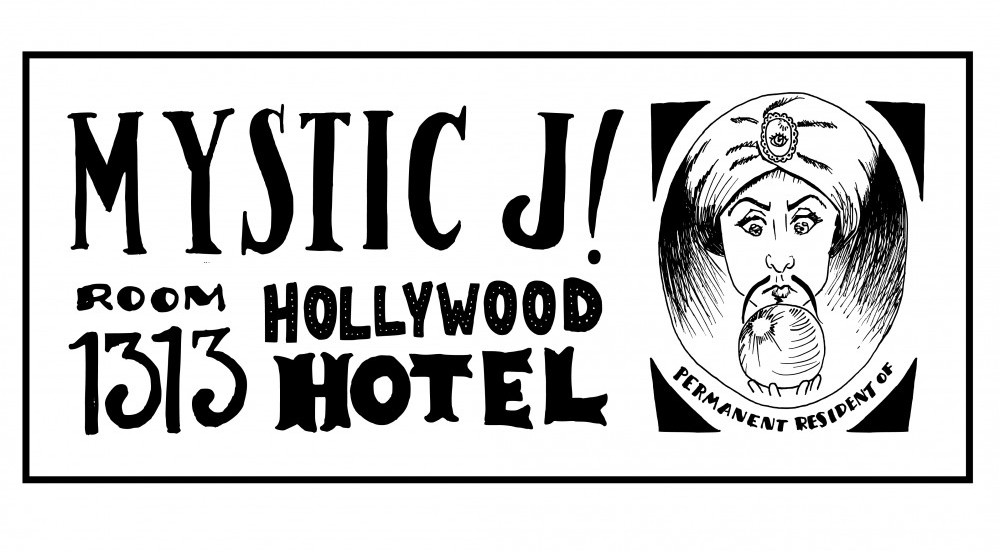On Jan. 21, in honor of Dr. Martin Luther King Jr., Portland State hosted an event featuring Angela Davis, a civil rights activist, author and educator. Davis spoke to the audience in the Peter W. Stott Center about police brutality in America, among other things.
Organized and hosted by PSU’s Office of Global Diversity and Inclusion, the sold-out event encouraged attendees to “live out” Dr. King’s legacy.
PSU student Michael Adams, accompanied by his brother Lionel Adams on guitar, sang the Black American National Anthem, “Lift Every Voice and Sing.” Master of ceremonies, writer and PSU instructor Walidah Imarisha, read a poem with fellow PSU instructor Turiya Autry as the spoken word duo Good Sista/Bad Sista.
Davis asked the audience to reflect on why the deaths of Eric Garner and Michael Brown and the subsequent non-indictment of the officers involved are considered shocking in the first place.
“We are shocked every time, even though it isn’t shocking. We must ask ourselves, then, how our shock implicates us,” Davis said.
“If you are familiar with Dr. King’s work, you are aware of the emphasis he placed on racism, militarism and poverty, which he sometimes rendered as materialism and which has also been translated as capitalism. I think this triumvirate expresses the interconnected nature of justice struggles, which continue almost five decades after the assassination of Dr. King,” Davis said.
Davis asked what it really means to live out Dr. King’s legacy. She proposed that we investigate the meaning of our freedom to determine that answer.
“We don’t know how to talk about racism. We don’t know how to talk about slavery. We don’t know how to talk about the way the war on terror has created prejudice against Muslims. We don’t know how to talk about the genocide of indigenous peoples,” she said.
She suggested that our inability to discuss these issues demonstrated a larger issue with the idea of freedom. Davis encouraged the audience to look inward as well as outward and investigate the grassroots civil rights movement of the 1960s.
Davis, born and raised in Alabama under the Jim Crow laws, felt that such reflection would assist in determining what exactly has changed to cause a stalemate in society’s progress. She mentioned the militarization of police as a possible cause and denounced the adoption of armed police on college campuses, to which the audience responded by cheering.
“I think we should disarm all police,” Davis said. “We have a serious problem with gun violence in this country.”
Davis explained that historical reflection on the legacy of Dr. King and the civil rights activists of the ’60s would lead us to recognize the structural racism of institutions. She concluded by saying that real change could happen only when we “act with urgency and…have patience.” She elaborated that we may not see the change take hold for many years but that should not deter us.
After Davis’ speech, she participated in a 30-minute question-and-answer session.
Members of the community were able to submit questions in the weeks before the event, as well as the day of.
One community member’s question asked Davis, “When you think of activists, you usually assume loud, defiant and aggressive—but for someone who doesn’t identify with these traits, do you think it’s possible for that person to become an effective activist without those traits? And in your opinion, what does it take to become an effective, powerful activist?”
Davis responded by saying that activists take many forms. She said she had never expected to become a public speaker, but her life’s circumstances led her to become a spokesperson for her cause.
“I would have been just as happy, or perhaps even happier, working in the background, teaching and organizing,” Davis said. “I think people underestimate the value of organizers…The really important work is producing connections and creating communities of resistance and communities of struggle. But I think that each person has to follow his or her own path…or their own passion and become an activist in the way [they] see fit.”
Another submission asked Davis, “[H]ow might you suggest PSU as an institution move forward toward safety for all, especially for people of color, people labeled with mental illness, people experiencing houselessness and surviviors of sexual assault and rape? How might you suggest the PSU community continue their struggle against violence and racist models of justice and move toward healing?”
“I think that you here in this community have to make those decisions,” Davis said. “But I can say that many of us who have been working around these issues for a very long time have learned that repression is not the answer. Imprisonment is not the answer.”
Davis continued by saying that incarceration perpetuates a cycle of violence for perpetrators of sexual assault and intimate violence.
“We have to think about a very different process of understanding and healing—a justice that is not based on retribution and revenge,” Davis said.
When asked for advice on working toward social justice, Davis suggested that communities question institutions and seek knowledge in diverse environments.
“I think it is so important for students and faculty and others in institutions such as this to recognize not only the strengths in these institutions, but the limitations as well,” Davis said.
“Knowledge comes from a whole variety of places. Knowledge is produced in all kinds of venues.”






